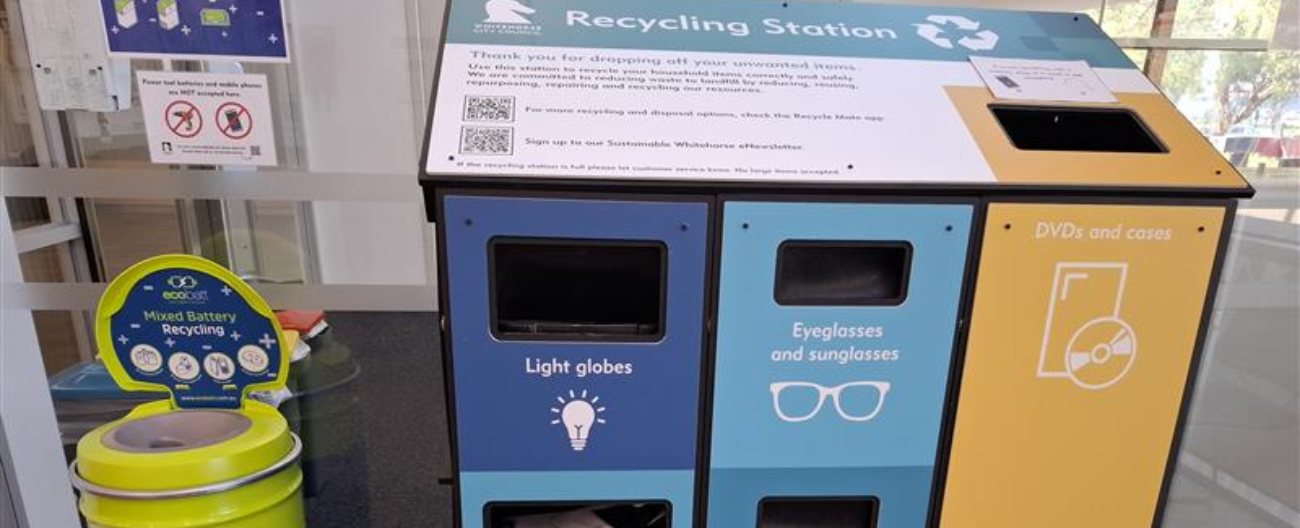Putting the right thing in your bin helps to reduce waste to landfill, increase recycling rates and move towards a circular economy.
Update your waste and recycling knowledge below or check the Recycle Mate app.
Your small act of using your bins correctly makes a big impact!
✔️ What goes in your recycling bin
- Hard plastic bottles and containers from the kitchen, bathroom or laundry (lids and labels left on) - such as milk or drink bottles, biscuit trays, takeaway containers, berry punnets, yoghurt and ice cream containers, butter containers, detergent bottles, sauce bottles, medicine bottles, shampoo and conditioner bottles, pump bottles and spray bottles.
- Aerosol cans (empty).
- Aluminium and steel tins/cans - such as pet food tins, canned food such as pet food, tuna, fruit and vegetables, coffee tins and soft drink cans.
- Aluminium trays and clean foil (scrunch into a loose tennis size ball).
- Glass bottles and jars (lids and labels left on) - such as sauce jars, medicine bottles, beverage bottles, spreads and coffee jars.
- Paper, paper bags, newspaper, magazines, advertising materials, letters, office paper, books, telephone book, notepads and envelopes (plastic window can be kept on).
- Cardboard, cereal boxes, food boxes, tissue boxes, egg cartons, toilet paper rolls, pizza boxes (including grease stained), medicine boxes and greeting cards.
❌ What does not go in your recycling bin
- Bagged recyclables.
- Plastic lined cardboard, such as tetra paks, milk cartons, juice cartons.
- Plant pots.
- Loose plastic bottle lids.
- Plastic coated paper plates.
- Plastic bags, cling wrap and soft plastic packaging.
- Reusable bottles and containers.
- Food.
- Polystyrene foam and foam meat trays.
- Clothing, textiles and shoes.
- Tissues, napkins and paper towel.
- Plastic squeezy tubes such as for toothpaste, bathroom products or herbs.
- Batteries and electrical waste.
- Drinking glass, mirrors and window glass.
- Crockery – such as Pyrex, plates, mugs, etc.
- Coffee cups, coffee cup lids and coffee pods.
- Disposable cutlery and plates.
- Shredded paper and laminated paper.
- CD and DVD cases.
- Steel pots and pans.
- Motor oil containers.
- Coat hangers.
- Scrap metal appliances such as car parts and cooking utensils.
- Waxed cardboard and food soiled cardboard containers.
- Plastic strapping.
- Syringes, needles and sharps.
Top recycling tips
- Keep recycling loose, not in bags. When you recycle loose, more of your recycling can be turned into new things, like jars, packaging and even roads.
- Keep soft plastics out of your recycling bin.
- Empty containers and bottles before you recycle them – no need to rinse.
- Flatten boxes and squash bulky containers down to save space. Recycle additional cardboard at the Recycling and Waste Centre for free.
- Keep waxed and coated cardboard out of your recycling bin. While it may look like regular cardboard, cardboard packaging used to hold liquids or frozen food is usually coated with plastic or wax to keep it from getting wet.
✔️ What goes in your FOGO bin
- Fruit and vegetable scraps.
- Bread, cereal, pasta and rice.
- Dairy leftovers such as cheese (no liquids) and eggshells.
- Loose tea leaves and coffee grounds.
- Serviettes and paper towel (small amounts, and only used to clean food spillages, no chemicals).
- Tissues.
- Small amounts of newspaper.
- Shredded paper (in limited amounts).
- Meat scraps, seafood and bones (raw and cooked).
- Crustacean shells such as prawns and crabs.
- Leftovers.
- Citrus, garlic, onion, chilli.
- Human and animal hair.
- Uncoated toothpicks, skewers and chopsticks.
- Bright green compostable liners with the Australian Standard AS 4736.
- Grass clippings, leaves and weeds.
- Flowers, garden cuttings, garden prunings.
- Small branches (up to 7.5cm in diameter and less than 1m).
❌ What Not to Put In Your FOGO Bin
- Teabags.
- Liners that are not bright green and do not have the Australian Standard AS 4736.
- Plastic bags.
- Compostable or biodegradable packaging (other than the approved compostable liners).
- Food packaging such as rubber bands, cling wrap, plastic, metal, glass and fruit and vegetable stickers.
- Oyster and clamshells.
- General rubbish.
- Vacuum dust.
- Liquids such as milk, oil and unfinished drinks.
- Building materials and treated timber.
- Magazines.
- Hazardous waste and chemicals.
- Syringes, needles and sharps.
- Hessian bag and plastic bags.
- Large logs and stumps.
- Animal waste, kitty litter or dead animals.
- Nappies.
- Plant pots.
- Rocks, stones, soil and potting mix.
Top FOGO tips
For tips and information on the FOGO service, visit our Food and Garden Organics page.
✔️ What goes in your garbage bin
- Bagged household rubbish.
- Nappies and animal droppings.
- Ceramics (wrapped).
- Window glass, mirrors, and Pyrex (wrapped).
- Polystyrene and foam meat trays.
- Vacuum dust.
- Plastic bags, soft plastic packaging and plastic film (or take to the local supermarket for recycling).
- Wet wipes and make-up wipes.
- Toothpaste tubes and toothbrushes.
- Waxed cardboard.
- Clam and oyster shells.
- Plastic lined cardboard, such as tetra paks, milk cartons, juice cartons.
- Small, dead animals (maximum of 2 and double-bagged).
❌ What does not go in your garbage bin
- Hot ashes.
- Syringes, needles and sharps.
- Batteries or items containing batteries.
- Electronic waste (anything with a battery, plug or cord).
- Chemicals and solvents.
- Unwrapped vacuum dust.
- Gas bottles and fire extinguishers.
- Timber, bricks, soil, concrete and other building materials.
- Bulky items including furniture, appliances and engine parts.
- Oil and paints.
- Any other liquids.
Top garbage tips
- Bag items in the garbage bin to keep our streets clean and workers safe.
- To find out how to dispose of other items, including batteries and syringes, visit our Other Recycling and Disposal Options page.
- Reduce your waste to landfill by composting your food and garden waste or popping food scraps and garden waste in your FOGO bin.
- Visit our Reduce, Reuse, Repair and Recycle page for other tips to reducing your waste.
The waste and recycling we collect is treated differently for recycling, organics or landfill depending on what it is.
Recycling
Council has a recycling processing contract with Visy Recycling. The items collected are taken to one of their two Materials Recycling Facilities here in Melbourne. These materials are then sorted, using manual and automated systems, into material groups including cardboard and paper, glass, plastics, aluminium and steel. The sorted material is baled ready for further processing and re-manufacture, primarily within Visy’s own operations.
Visy currently has a solution for over 80% of the kerbside recycling bin contents. The contents are routinely processed and primarily re-made into new packaging products, by Visy, right here in Australia and New Zealand. Learn more about their steps to a circular economy
- Paper and cardboard: Visy recovers 1.56 million tonnes of paper and cardboard annually. After sorting at the recycling facility it is bailed and sent to one of eight paper mills in Australia where the VISY paper mills manufacture them into recycled craft paper or in corrugated cardboard
- Glass: Visy is the largest glass manufacturer in Australia and New Zealand and recovers 409,000 tonnes of glass annually. The glass collected is screened and separated by colour for use in a furnace, before it's blown for use by manufacturers within Australia and New Zealand for new bottles and jars. Some of the product including glass fines is refined and sold as glass sands for use in road base.
- Steel: Visy recovers 31,000 tonne of steel. Steel is sorted, crushed and shredded before melting and rolling. This is then cut and formed into new food cans.
- Aluminium: Visy recovers 20,000 tonnes of aluminium. Aluminium is shredded, melted and rolled before forming into drinks cans.
- Hard plastic bottles and containers: Visy recovers 100,000 tonnes of plastic each year. Plastics collected are generally separated into specific types using manual and optical sorting then shredded, washed, sterilised before being turned into pellets. Plastic pellets are moulded and blown into new bottles for local and overseas markets.
Food Organics and Garden Organics (FOGO)
Our optional FOGO service is taken to a large scale composting facility located in Dandenong South and run by Bio Gro.
The items will be checked for incorrect items, processed through machines and composted at high heats, where it will be turned to quality mulch and compost. The product will be sold to farms and gardens, to help make plants and food grow across Victoria.
Compost is important as it helps create healthy soils, retain water in the soul, assist with temperature control, reduces reliance on chemicals, helps suppress weeds and increases the diversity of microbes and insects in the soil.
Watch this short video for an overview of the process at Bio Gro.
Garbage
Items put in your garbage bin are taken to the South East Melbourne Transfer Station (SEMTS) and then transferred to a landfill site in Werribee, run by Cleanaway.
Garbage that goes to landfill can never be used again. The items buried break down slowly and produce methane gas, a harmful greenhouse gas which contributes to climate change.
We encourage our community to reduce, reuse, recycle prior to using the garbage bin.







